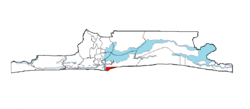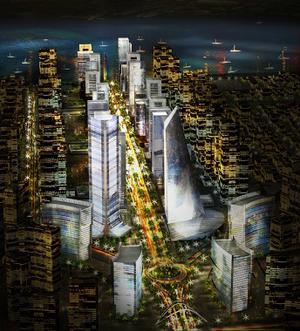Eko Atlantic
City in Lagos State, Nigeria From Wikipedia, the free encyclopedia
Eko Atlantic, officially Nigeria International Commerce city, also known as Eko Atlantic City, is a planned city in Lagos State, Nigeria, being constructed on land reclaimed from the Atlantic Ocean.[3] Upon completion, the new peninsula is anticipating at least 250,000 residents and a daily flow of 150,000 commuters. The development is also designed to help in stopping the erosion of Lagos city's coastline.[4]
Eko Atlantic | |
|---|---|
City | |
| Nigeria International Commerce city[1] | |
 Rendition of Eko Boulevard in the Business District | |
| Motto(s): Live and Work | |
 Eko Atlantic shown within the State of Lagos | |
| Coordinates: 06°24′00″N 03°24′18″E | |
| Country | Nigeria |
| State | Lagos State |
| LGA(s) | Independent |
| Founded | 2003 |
| Incorporated | 2014[1] |
| Government | |
| • City Planner | South Energyx Nigeria Limited |
| • Chairman SENL | David Frame |
| Area | |
• Total | 25 km2 (10 sq mi) |
| • Land | 10 km2 (4 sq mi) |
| • Water | 15 km2 (6 sq mi) |
| Time zone | UTC+1 (WAT (UTC+1)) |
| Area code | 010[2] |
| Website | EkoAtlantic.com |
| This project is currently under development | |
Its main objective is to reduce erosion, which includes future sea level rise and storm surges. On the Lagos Bar Beach, coastal erosion has long been an issue, happening at a rate of 30 m year in particular. Wave tides, littoral movements, and sediment characteristics are examples of natural causes.[5]
Around 1960, man began adding nourishments to the Bar Beach in an effort to stop the significant loss of beach width caused by erosion. Despite being fed with enormous amounts of material, the beach continued to erode. The city of Lagos's expanding population is another issue, as it increases the need for space for residential, commercial, and recreational activities.[6]
The private project developer South Energyx Nigeria Ltd. (SENL) has started the Eko Atlantic City Development Project to address this space shortage as well as the land loss caused by the erosion of the Bar Beach. This project involves reclaiming 9 km² of ground in front of Bar Beach, just east of the East Mole.[6] A revetment with a length of around 8.4 km surrounds the newly recovered area to prevent erosion. Among other things, Royal Haskoning provides advisory services for Eko Atlantic City's marine construction.[6]
The city adjoins Victoria Island district of Lagos city, and the Phase 1 area of Lekki to the north, while the entire Western, eastern and southern borders is a coastline. Eko Atlantic is expected to rise as the next generation of property on the African continent; having a total of 10 districts, spread across a land area of approximately 10 square kilometres (3.9 sq mi), the city will satisfy needs for financial, commercial, residential and tourist accommodations.[7]
Eko Atlantic development is being carried out as a public–private partnership (PPP) with private companies and investors providing the funding, whilst the Lagos State Government (LASG) is a strategic partner, with the support of the federal government.[8] The contractors are China Communications Construction Group LTD (CCCC), a company that works in the field of marine dredging and landfill operation. Consultants are Royal Haskoning (traffic and transport expertise) and ar+h Architects. South Energyx Nigeria Ltd., a subsidiary of the Chagoury group, was specifically created to undertake the development. Testing of the sea defence system took place at the DHI Institute in Copenhagen, Denmark, where models were successfully tested for one-in-a-hundred-year ocean surges, and one-in-120-year, one-in-150-year and one-in-1,000-year storms.[9]
Overview

Eko Atlantic will satisfy needs for financial, commercial, residential and tourist accommodations, with infrastructure in line with modern and environmental standards.[10] These standards will offer the city's residents water, waste management, security and transportation systems. The city will also have an independent source of energy generated specifically for the city.[7]
Eko Atlantic is situated on land reclaimed from erosion and is protected by a coastal revetment designed by Royal Haskoning colloquially known as the Great Wall of Lagos,[11] a planned 8.5 km long barrier constructed primarily of rock and faced with concrete accropode armour.[citation needed]
The Eko Atlantic City project received global attention in 2009, as the Lagos State Government and its private sector partners on the Project, South Energyx, received the Clinton Global Initiative Commitment Certificate.[12][13][14]
Purpose
Summarize
Perspective
In addition to providing a state-of-the-art business district for West Africa, the city aims to restore land lost to coastal erosion over the past century, offer a long-term solution to the erosion problem along Lagos' coastline, shield Victoria Island from ocean surge, and create job opportunities. Seven kilometers of revetment will also be built.[15][16] The city will have its own bureaucracy and be regarded as a separate municipality. It will have an offshore banking zone and permit investors to transfer money freely.[15]
Districts
When the city is finished, it will have 3,000 buildings and 400,000 homes for residential, business, financial, and tourist lodging purposes.[15] Ten districts will make up the city,[15] including:
- Business Districts
- Fall lights
- Marina Districts
- Downtown
- Eko Island
- Avenues
- Four Bridges
- Eko Drive
- East Side Marina
- Ocean Front[15]
Pricing
The cost of a plot of land is dependent on its size and location. Land is sold per m2. Plot sizes in Phases 1 and 2 start from approximately 2,200 m2 and prices per square meter within this phase start from $1,150.
In Phase 3, land within this phase starts from approximately 1,200 m2 mainly for low-rise residential houses where the land prices are at $1,050.
There is no maximum cap on the amount of land that can be purchased. Each plot of land can be used for a residential or commercial development or a mix of both as Eko Atlantic is designed to be a mixed-use city.
The plots in Phases 1 and 2 have been created to accommodate mid to high-rise buildings. In Phase 3, some plots have been created to accommodate single residential dwellings and low-rise developments.
Milestones
Summarize
Perspective

As of May 2009, while the project was still in its dredging phase, about 3,000,000 cubic metres (3,900,000 cu yd) had been sand-filled and placed in the reclamation area, while about 35,000 tonnes of rock had been delivered to the site.[4] In certain parts of Bar Beach, the land being reclaimed can already be seen. Dredgers work round the clock to sand-fill the site.[citation needed] The reclamation was reported to cost around $6B.[17]
On 21 February 2013, a ceremony was held to mark the reclamation of land of Eko Atlantic, with Goodluck Jonathan, former U.S. president Bill Clinton, Babatunde Fashola, Bola Tinubu, Aminu Tambuwal, and Ibikunle Amosun attending.[18][19]
In March 2014, David Frame, managing director of South Energyx Nigeria Ltd., the firm responsible for the development, confirmed that "The first residential tower will open in 2016".[20]
By November 2020, a few buildings, most notably Eko Pearl Towers, had been completed, with several more under construction and at planning stages. The city had become an active venue for popular afro-concerts and sports events like the Lagos City Marathon and Copa Lagos.[21][22][23][24]
Eko Atlantic City has secured an EDGE certification from the International Finance Corporation (IFC), a member of the World Bank Group.[25]
Controversy
Summarize
Perspective

The Eko Atlantic project has been criticized by residents living nearby, who say that ongoing construction works have caused coastal erosion and ocean surges.[26] Ocean water surges through living areas, flooding access roads and taking down electricity poles and forcing residents to relocate. The Lagos State Government is also being criticized for failing to involve the people in the project.[27][28][29]
In August 2012, the Atlantic Ocean surged and overflowed its banks, sweeping 16 people into the Atlantic Ocean, killing several, and flooding Kuramo Beach, Victoria Island and other areas.[30] According to an environmental expert, "the ocean surge occurred as a result of the failure of the contractors handling the sandfilling activities of the proposed Atlantic Ocean City, to put in place measure that would reduce the effect of the surge on the environment".[31] The Lagos State chapter of the People's Democratic Party issued an official statement, blaming the ACN (now APC)-led state government's sand filling for the ocean surge. The party called for a stop to the Eko Atlantic project and immediate compensation for the bereaved families.[31]
In April 29th 2024, demolition of Landmark beach began; to give way to the Lagos-Calabar Coastal Highway, Nigeria’s biggest public infrastructure project. Discussions around the ownership of the coast; Eko Atlantic and Landmark's claim to this contentious and premium waterfront.[32]
See also
References
Further reading
External links
Wikiwand - on
Seamless Wikipedia browsing. On steroids.


